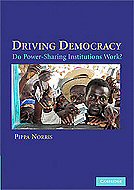|
Driving Democracy: Do Power-Sharing Institutions Work?
|
|
Pippa Norris
|

|

Proposals for power-sharing constitutions remain controversial, as highlighted by contemporary debates in Iraq, Afghanistan, Nepal, and Sudan. This book updates and refines the theory of consociationalism, taking account of the flood of contemporary innovations in power-sharing institutions that have occurred worldwide. The book classifies and compares four types of political institutions: the electoral system, parliamentary or presidential executives, unitary or federal states, and the structure and independence of the mass media. The study tests the potential advantages and disadvantages of each of these arrangements for democratic governance. Trends in democracy are analyzed for all countries worldwide since the early 1970s. Chapters are enriched by comparing detailed case studies. The mixed-method research design illuminates the historical developments within particular nations and regions. The conclusion draws together the practical lessons for policymakers.
Pippa Norris is the McGuire Lecturer in Comparative Politics at the John F. Kennedy School of Government, Harvard University, and she has recently served as Director, Democratic Governance, United Nations Development Programmer. Her work compares elections and the public opinion, gender politics, and political communications. Companion volumes by this author, are also published by Cambridge University Press, include A Virtuous Circle (2000), Digital Divide (2001), Democratic Phoenix (2002), Rising Tide (2003), Electoral Engineering (2004), Sacred and Secular (2004), and Radical Right (2005).
|
|
